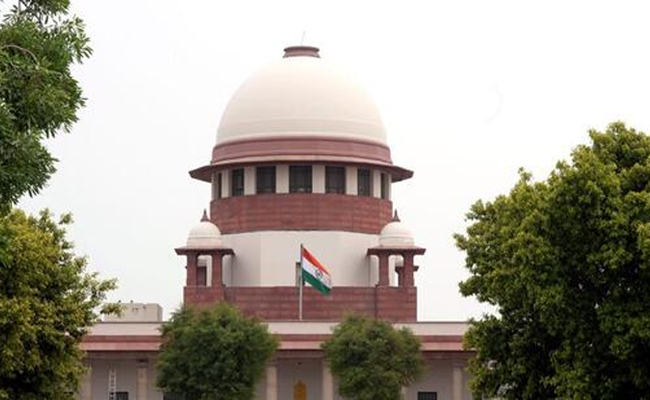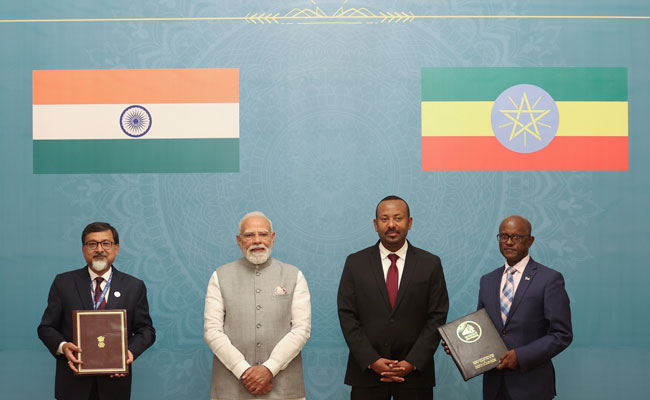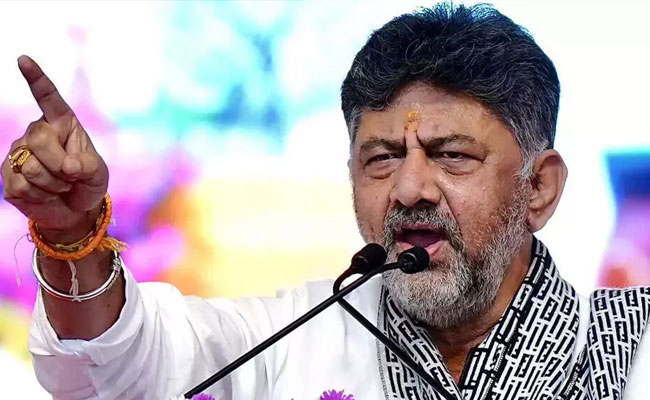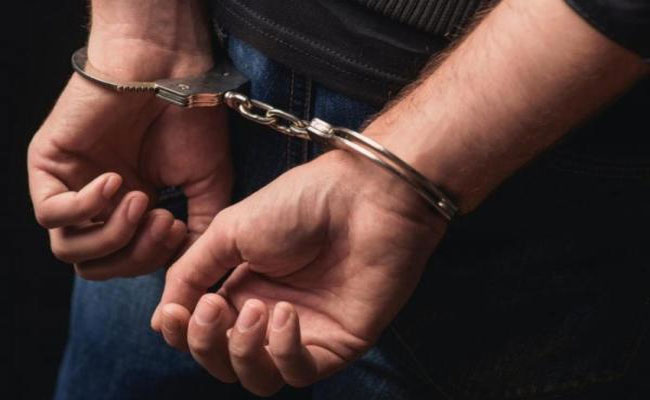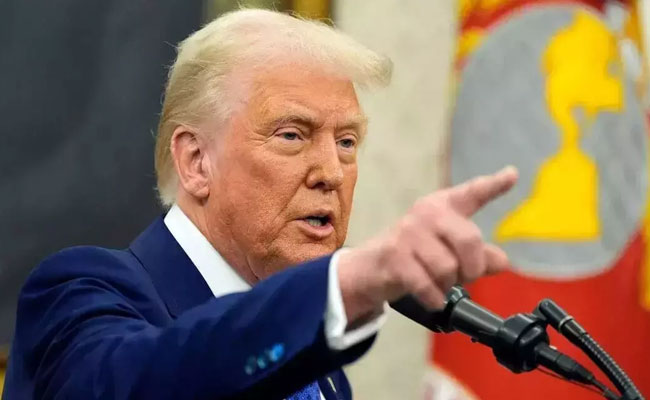New Delhi (PTI): The Supreme Court on Thursday granted three more weeks to the Election Commission to respond to the pleas of Congress general secretary Jairam Ramesh and others against the recent amendments to the 1961 election rules.
A bench comprising Chief Justice Sanjiv Khanna and Justice Sanjay Kumar had issued a notice to the Centre and the poll panel on January 15 on Ramesh's plea and sought a response.
Senior advocate Maninder Singh, appearing for the poll panel, sought three more weeks to file the reply.
The bench allowed Singh's prayer and set the July 21 week for hearing.
Aside from Ramesh, two similar PILs filed by Shyam Lal Pal and activist Anjali Bhardwaj are pending.
Senior advocates Kapil Sibal and Abhishek Singhvi represented Ramesh.
The petitioners have said the amendments to the 1961 Conduct of Election Rules were made "very cleverly" and barred any access to CCTV footage claiming it would reveal the identity of the voter.
Singhvi previously said voting choices were never revealed and the CCTV footage couldn't reveal votes and urged the bench to ask the poll panel and the Centre to file their responses before the next date of hearing.
Ramesh's plea was filed in December and expressed "hope" that the apex court would help "restore the fast eroding" integrity of the electoral process.
The government has tweaked an election rule to prevent public inspection of certain electronic documents such as CCTV camera and webcasting footage besides video recordings of candidates to prevent their misuse.
"The integrity of the electoral process is fast eroding. Hopefully the Supreme Court will help restore it," Ramesh said.
Based on EC's recommendation, the union law ministry in December amended Rule 93(2)(a) of the 1961 rules, to restrict the type of "papers" or documents open to public inspection.
Bhardwaj, in her separate plea filed through lawyer Prashant Bhushan, challenged the recent amendment to election rules which allegedly restrict public access to election-related records.
The PIL challenges the validity of the Conduct of Elections (Second Amendment) Rules, 2024 and argues the amendment to Rule 93(2)(a) of the Conduct of Election Rules, 1961 violates Articles 14, 19, and 21 of the Constitution by restricting citizens' access to crucial election-related documents.
Prior to the amendment, it was stated, Rule 93(2)(a) provided "all other papers relating to the election shall be open to public inspection".
"The impugned amendment is a blatant violation of Article 19(1)(a) and 21 of the Constitution of India as it brings opaqueness and restricts people's fundamental right to access vital documents and papers related to elections," the plea said.
The amendment, said the plea, sought to narrow and restrict public access to election related records, Rule 93(2)(a) of the Conduct of Election Rules, 1961 prior to the 2024 amendment.
The new amendment is stated to have modified the provision to "all other papers as specified in these rules relating to the election shall be open to public inspection".
The petitioner argued the change introduced new and arbitrary restrictions on public access, limiting transparency in the electoral process.
The plea said the amendment infringed upon the fundamental right to information enshrined in Article 19(1)(a) and the right to a free and fair election under Article 21.
It claimed the amendment curtailed public scrutiny of election records, leading to reduced transparency and potentially facilitating corrupt practices.
The amendment, the plea said, imposed arbitrary constraints by restricting access to only those records explicitly mentioned in the rules, excluding others without justification.
By limiting access to election documents, the amendment is seen as contrary to the spirit of the RTI Act, which promotes governmental accountability and transparency, it added.
Let the Truth be known. If you read VB and like VB, please be a VB Supporter and Help us deliver the Truth to one and all.
Addis Ababa (PTI): India and Ethiopia on Tuesday elevated their historical ties to a strategic partnership, as Prime Minister Narendra Modi held wide-ranging talks with his Ethiopian counterpart Abiy Ahmed Ali during which they discussed issues of bilateral and mutual interest.
Modi, who arrived here from Jordan on his maiden bilateral visit, was accorded a ceremonial welcome at the National Palace ahead of the bilateral talks, reflecting the vibrant India-Ethiopia relations rooted in shared history and a promising future.
"We are elevating India and Ethiopia relations to a strategic partnership. This step will provide new energy, new momentum and new depth to our ties," Prime Minister Modi said during the delegation-level talks.
He thanked PM Ali for his support in India's fight against terrorism. "The support of friendly countries in this struggle against terrorism holds great significance," Modi said.
"Today, we got the opportunity to deliberate on the key aspects of our cooperation, such as economy, innovation, technology, defence, health, capacity-building and multilateral cooperation. I am pleased that today, we have decided to double the student scholarship for Ethiopia in India," Modi said.
Modi said that India and Ethiopia have shared contact, dialogue, and exchange for thousands of years. The two countries, which are rich in languages and traditions, are symbols of unity in diversity, he added.
"Both countries are democratic powers committed to peace and the welfare of humanity. We are co-travellers and partners of the Global South. On international platforms, we have stood shoulder-to-shoulder," he said.
The two sides signed eight MoUs/agreements, including upgrading ties to 'Strategic Partnership', customs cooperation, establishing data center at the Ethiopian Foreign Ministry, UN Peacekeeping training cooperation, debt restructuring under G20, more ICCR scholarships and AI short courses for Ethiopians, and support for maternal and neonatal healthcare.
Modi said the African Union's headquarters in Ethiopia makes the country a meeting point of African diplomacy. "Inspired by the common vision of an inclusive world, in 2023, India ensured that the African Union became a G20 member," he said.
In 2023, during India’s G20 Presidency, the African Union was admitted as a permanent member of the G20.
Modi said that though this is his first visit, he felt a deep sense of belonging and warmth, reflecting the thousands of years of connection between the two countries.
On his part, Prime Minister Ali said the two countries share over thousands of years of connection through trade, diplomacy, education, culture and even in our food and traditions. "These ties continue to shape a deep friendship, collaboration and mutual respect between our people," he said.
"We also appreciate your consistent message that Africa's priorities must lead the partnership. These kinds of dignified, respectful messages for Africa are very important. Mr Prime Minister, keep pushing. That is the type of message we are expecting from all our trusted friends," Ali said.
He said this aligned fully with Ethiopia's development plan - African-owned, African-led, and African-defined.
"Today, we meet with a clear focus to shape a modern partnership, grounded in sovereignty, self-reliance and practical cooperation. Our cooperation is rooted in equality and South-South solidarity," he said.
"Our economy is performing strongly. Last year, we grew 9.2% and this year we are expecting 10.3% GDP growth. Besides GDP growth, our FDI inflow is also rising big time. India is the leading source for our FDI," he said.
"We have more than 615 Indian companies which are investing in Ethiopia. This all gives our cooperation a strong foundation of trust. I think our decision today that we elevate our historic relationship to a strategic relationship is the right decision," he added.
Ethiopia also conferred its highest award - The Great Honour Nishan of Ethiopia - on PM Modi. He is the first global head of state to receive this award.
Prime Minister Modi also went to the Friendship Park and Friendship Square in Addis Ababa with PM Ali.
In a warm and special gesture, PM Modi was earlier received by his Ethiopian counterpart at the airport and accorded a warm and colourful welcome.
"Ethiopia is a nation with great history and vibrant culture," Modi said.
PM Ali informed his Indian counterpart about the varieties of Ethiopian coffee during informal talks.
"At Addis Ababa airport, took part in a traditional Coffee Ceremony with Prime Minister Abiy Ahmed Ali. The ceremony beautifully highlights Ethiopia’s rich heritage," Modi said.
In a unique gesture, the Ethiopian Prime Minister drove Modi to the hotel.
On the way, he took a special initiative of taking PM Modi to the Science Museum and Friendship Park, which was not in the itinerary.
"Gratitude to Prime Minister Abiy Ahmed Ali for showing me glimpses of Ethiopian history and culture at the National Palace Museum in Addis Ababa. It was a powerful reminder of Ethiopia’s rich traditions," Modi said in a post on X.
The Nobel Peace Prize-winning Ethiopian PM’s special gestures show remarkable respect for Modi, sources said.
"Thank you Ethiopia for a welcome that was unforgettable. The Indian community showed remarkable warmth and affection. India-Ethiopia friendship is going to get even more robust in the times to come," Modi said.
When Modi arrived at the hotel, he was warmly welcomed by the members of the Indian community. Local artists performed dances. Some of them danced on the theme of the popular Hindi song 'Aisa Des Hai Mera' to welcome him.
On Wednesday, Modi will address the Joint Session of Parliament and share his thoughts on India's journey as the "Mother of Democracy" and the value that the India-Ethiopia partnership can bring to the Global South.
PM Modi arrived in Ethiopia from Jordan, where he held a one-on-one meeting with King Abdullah II at the Husseiniya Palace on Monday before the delegation-level talks.
India and Jordan also inked MoUs in the fields of culture, renewable energy, water management, digital public infrastructure and twinning arrangement between Petra and Ellora, aimed at giving a major boost to bilateral ties and friendship.
From Ethiopia, Modi will visit Oman on the final leg of this three-nation tour.

